
The Future, from the Past  Though
much of the dialogue is naive and stodgy, the look of the film is impressive:
together with Fritz Lang's Metropolis it had a lasting influence on later
science fiction films, with its huge construction machines and the gleaming new
city: and it seems to have been the source of the wide-shouldered costumes
(left) which still frequently turn up to suggest a futuristic
society. Though
much of the dialogue is naive and stodgy, the look of the film is impressive:
together with Fritz Lang's Metropolis it had a lasting influence on later
science fiction films, with its huge construction machines and the gleaming new
city: and it seems to have been the source of the wide-shouldered costumes
(left) which still frequently turn up to suggest a futuristic
society.The film attracted considerable attention, not only for its visuals, but for the score by Arthur Bliss. Parts of this were issued on gramophone records - the first time parts of a film score (as opposed to the songs) had been so issued - and much was made of the fact that an established composer had written the music (film music was looked down on by the musical establishment, and indeed much of it had been very poor). In fact Bliss's score, though atmospheric, is not 'through-composed', but consists of set-pieces which have been used (and cut about by the sound editor) at various points in the film: the famous March gets rather over-used. About the same time William Walton (then a less established composer than Bliss) wrote the music for As You Like It, starring Laurence Olivier: but of much more importance to film music was the score, written under pressure in the autumn of 1935, for Warner Brothers' film Captain Blood, designed to showcase their new star Errol Flynn. The score was by Erich Wolfgang Korngold, an established operatic composer: his opera Die Tote Stadt was popular in the 1920s; rather against his better judgement he was persuaded into writing this score, and produced a sweeping, romantic and complex score which gives the film a tremendous lift and excitement. The only previous score to come anywhere near it had been Huppertz's score for Die Nibelungen (which I wrote about on March 23rd); Korngold's score had a richness and complexity never heard before in the cinema, very far from the concept of 'background music', which in this one film revolutionised the whole style of symphonic scoring for the cinema. At the time none of this was recognized, but in retrospect the attention given to Bliss's score for Things To Come seems exaggerated. Posted: Tue - May 29, 2007 at 09:37 AM by Roger Wilmut |
Quick Links
About Me:
Roger Wilmut XML/RSS Feed
MY PODCAST
Archives
Calendar
Blogroll
WEBRINGS
Statistics
Total entries in this category: Published On: Mar 11, 2016 05:00 PM |
||||||||||||||||||


